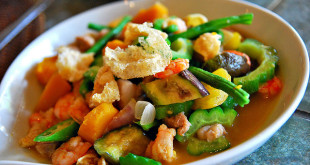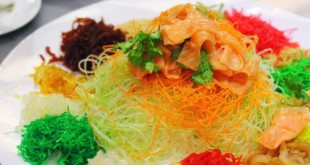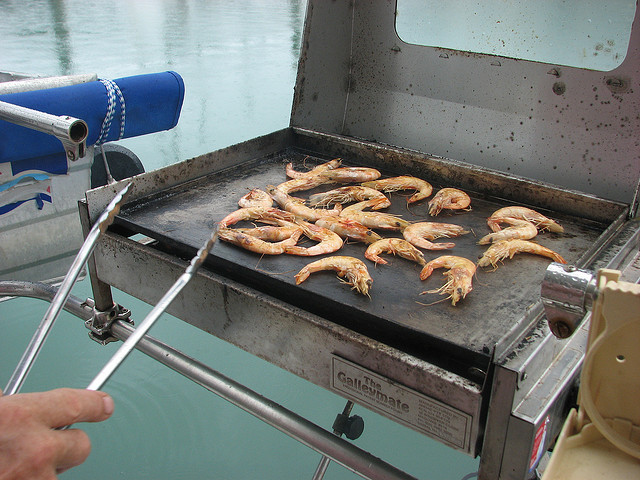The food of Malaysia is as diversely-influenced as the entirety of its culture, resulting in dishes that feature vibrant colors, textures, and flavors. Your Malaysian trip will not be complete without sampling some, or even all, of the dishes that are on this list below.
Prepare your taste buds for a culinary adventure that will leave you pleasantly surprised and wanting even more of the unique explosion of flavors that only Malaysian cuisine can bring.
1) Nasi Lemak
Directly translated as “rice in cream” or “fatty rice”, this fragrant rice dish is considered as Malaysia’s national dish. The rice is cooked in coconut milk with pandan leaf, and is served with different food accompaniments depending on where it is prepared, and who prepares it – with small fish, with sambal (a chili-based condiment), with curry (lamb, chicken, or fish), with fried egg, with curried vegetables, with fish cakes, with dried anchovies, or with pork or beef (for non-Halal diners).
2) Rendang
This spicy meat dish can be prepared using either chicken or beef, and may sometimes be referred to as a type of curry (although experts state that this is not true). The chicken or beef is simmered with coconut milk and spices for a few hours, until the liquid evaporates, resulting to a creamy dish that is packed with flavor. Best eaten with mounds of steamed white rice.
3) Satay
Also called sate, this is prepared by seasoning meat (sliced or diced chicken, beef, pork, fish, mutton, or goat), skewering it with a bamboo skewer or coconut palm frond, and then barbecuing or grilling the meat over charcoals. The tasty skewered meat is then served with a flavorful sauce (usually a tangy peanut-based sauce), and can be eaten with rice or as a match for alcoholic beverages (such as beer).
4) Laksa
This spicy noodle soup has Malay and Chinese elements, with two basic types: curry laksa, and asam laksa. Curry Laksa is a coconut milk-based curry soup that usually contains shrimp, bean curd puffs, fish sticks and garnished with Vietnamese coriander (the laksa leaf); it is then served with a fiery spoonful of sambal paste.
Asam Laksa, on the other hand, is a fish-based soup that is made sour by the addition of tamarind or dried slices of sour mangosteen; this type of laksa is prepared with shredded fish, thinly-sliced vegetables (onions, cucumber, lettuce, mint, pineapple, red chilies, Vietnamese mint, ginger buds), and then topped with a sweet shrimp paste.
5) Roti Canai
A flatbread made from ghee, egg, flour, and water, roti canai is torn into pieces and then dipped into a flavorful curry sauce for that amazing burst of flavor. It is usually enjoyed as breakfast fare (along with teh tarik or milky tea), but it can also be eaten throughout various times of the day.
6) Bak Kut Teh
Directly translated into English as “meat bone tea”, this dish can be prepared with either chicken or pork in a very flavorful broth. The broth is simmered for as long as possible with a number of herbs and spices, such as cloves, star anise, cinnamon, garlic, dong guai, and fennel seeds to achieve the distinct taste.
7) Char Kway Teow
Typically prepared and sold at hawker (roadside) stalls, char kway teow is a filling and tasty noodle Malaysian dish made from flat rice noodles that are stir-fried with light and dark soy sauce, bean sprouts, prawns, clams or cockles, chopped chives, Chinese sausage, egg, fish cake, and some belachan (shrimp paste).
8) Hokkien Mee
This is a fried noodles dish cooked Hokkien style; the thick yellow noodles are made extra flavorful by braising with dark soy sauce, squid, fish cake, pork, and cabbage. It is then topped with crispy fried pork lard – definitely calorific, but those who have tried it say that it’s very much worth the high calorie and cholesterol content!
9) Sang Har Kway Teow
Fresh river prawns are cooked in the Cantonese style in a thick broth with egg, and then flat or egg noodles are added into the flavorful mix. The tenderness of the prawn meat beautifully compliments the chewiness of the noodles.
10) Rojak
The term “rojak” means “mixture” in Malay; this salad dish is a wonderful mixture of fruits and vegetables with yu char kwai (fried bread stick), and a thick, dark shrimp paste.
Nothing best completes a trip to a new place than trying out what the local cuisine has to offer, and the Malaysian food dishes listed above will definitely make your trip to Malaysia a more memorable one. The new flavors and textures you will encounter may take some getting used to, but you will surely remember these food dishes with fondness – and may even find yourself craving them long after you have first enjoyed their unique tastes.
Please comment and let us know which one is your favorite Malaysian food.
Photos by avlxyz, Hyoh, T|ng~, avlxyz, kenner116, Hyoh, huppypie, a hobby and ImipolexG




